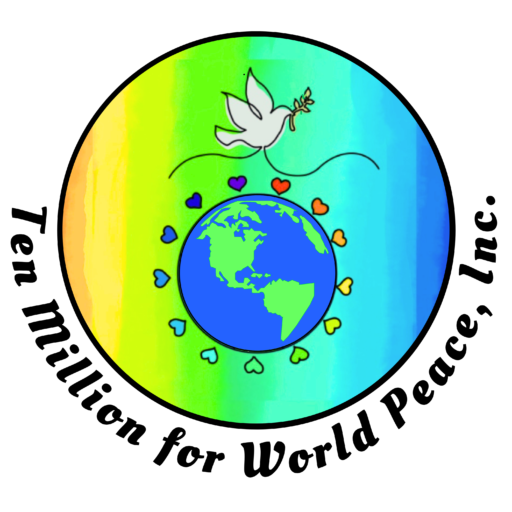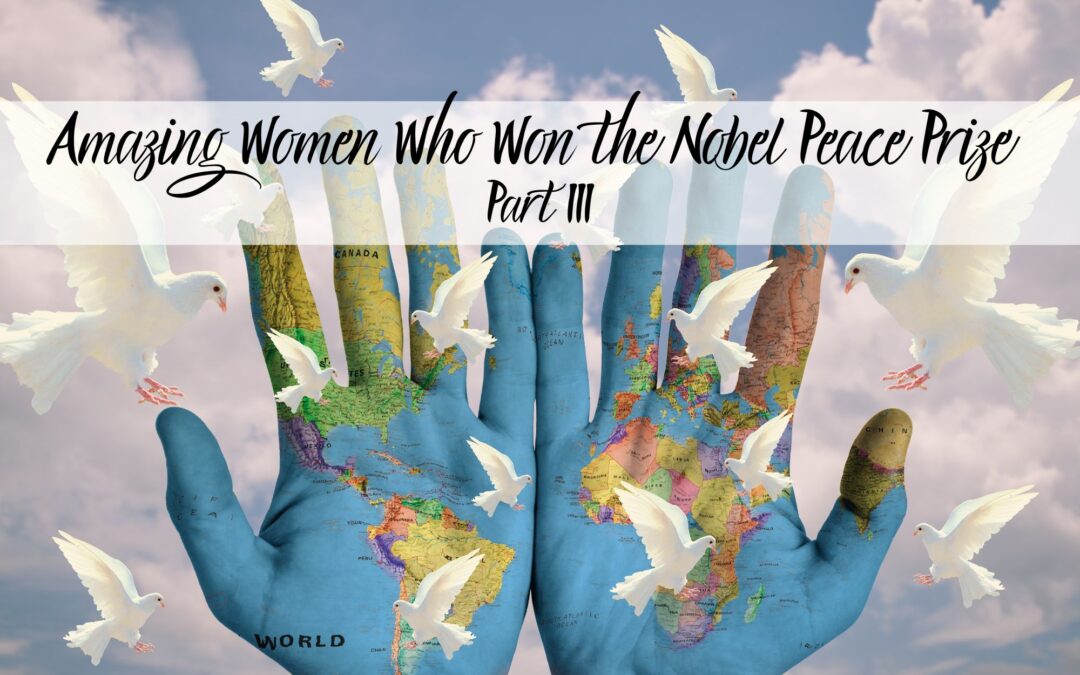In this last post about the most recent female Nobel Peace Winners, you’ll learn about the remaining seven women who strived for peace and the rights of others and were recognized for their outstanding efforts.
In 2011, three remarkable women shared the Nobel Peace Prize for their non-violent struggle for the safety of women and for women’s rights to fully participate in peace-building work.
Ellen Johnson Sirleaf – Liberia, 2011.
Ellen Johnson Sirleaf, also known as Africa’s “Iron Lady” was president of Liberia from 2006-2018. While she grew up in Liberia, she was educated in the USA and got her Masters Degree in Public Administration from Harvard.
Like many others who have been awarded the Nobel Peace Prize, Sirleaf spent time in prison after working for justice during the General Samuel Doe regime under President Charles Taylor. Before that, she served as administrative assistant and director for the United Nations Regional Bureau for Africa.
Ellen was named one of the World Top Ten Leaders by Newsweek Magazine in 2010 and also was awarded the U.S. Presidential Medal of Freedom, the top civil award for her courage and non-stop commitment to freedom and improving lives in Liberia and across Africa.
Leymah Gbowee – Yemen, 2011.
Only 17 when Liberia’s civil war began, Leymah played an instrumental role leading a non-violent movement to unite Christian and Muslim women in working to end the strife. It’s been said this momentous event paved the way for President Sirleaf’s election.
Gbowee co-founded the Women Peace and Security Network Africa in Accra and served as Executive Director for six years and also founded the Gbowee Peace Foundation Africa, which offers leadership development education and opportunities for women of all ages. Her list of contributions and organizational participation is lengthy and quite impressive.
Tawakkol Karman – Liberia, 2011.
The third shared winner for 2011, Tawakkol Karman is a human rights activist from Yemen. She has worked tirelessly for women’s rights in her country and vigorously explored the concept of revenge versus justice for the fate of deposed dictators.
Malala Yousafzai – Pakistan, 2014.
Back in 2009, the Taliban who were in charge decided that all girl’s school should close or face stringent consequences. Malala defied the ban and continued to go to school. She also created a blog about educational rights for females and as a result was targeted and shot in October, 2012 by the Taliban but survived! Even this dramatic experience did not dissuade Yousafzai from campaigning for this mission.
Today the Malala Fund provides education for girls in several countries including Pakistan, Nigeria, Jordan and Kenya. At age 17, she was the youngest recipient of a Nobel Prize
Nadia Murad – Iraq, 2018.
After a brutal massacre of hundreds of Yazidi men and elderly women by the Islamic State, many of the young women, including Nadia Murad were held as sex slaves and made to convert to a different form of Islam. Somehow she escaped to Germany after several months and shared her story of suffering with the world. Her goal was to bring the abusers to justice.
Then in 2016, the United Nations appointed Murad as the first Goodwill Ambassador for the Dignity of Human Trafficking. This kind of atrocity had already been labeled as a war crime back in 2008 by the United Nations.
Nadia won the Nobel Peace Prize in 2018 for her valiant efforts to end the use of sexual violence as a weapon of war and armed conflict. Her hope was to ensure that future generations of women do not become victims in this same way.
Maria Ressa – Philippines, 2021.
While born in Manilla, the Philippines, Maria and her family moved to the United States where she graduated from Princeton before moving back to her native land. Once home, she earned her master’s degree and became a local CNN correspondent, reporting on South East Asian terrorism.
A co-founder of the Rappler online news site in 2012, she fearlessly defended freedom of expression in her investigative journalism. She exposed the abuse of power and violence in the authoritative regime of President Duterte. Ressa has also revealed the abuse of social media to spread fake news, harass opponents of the regime, and manipulate community conversations.
Narges Mohammadi – Iran, 2023.
Born in Iran in 1972, Narges Mohammadi received the Nobel Peace Prize in recognition of her courageous “fight against oppression of women in Iran and to promote human rights and freedom for all.” Her brave efforts to create change have taken a large toll, with many arrests and sentencing to 31 years in prison, in addition to 154 lashes!
Mohammadi has been an activist for women’s rights since the 1990s. By 2011, she had been arrested and sentenced to years of jail time for helping other incarcerated activists and their families. After being released on bail she worked tirelessly against the death penalty in Iran, as well as torture and sexualized violence against political prisoners especially women.
Remarkable Women
These inspiring women have bravely worked toward peace and human rights in many countries and in some of the worst possible conditions imaginable. They suffered the harsh cruelty that sadly often accompanies speaking out against corrupt and violent politicians and regimes.
We look forward to celebrating more courageous women like these who will win future Nobel Peace Prizes and for others who may not have world recognition, but make a significant impact in their own communities.

